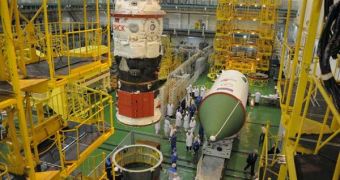Today, at 1422 GMT, a new International Space Station (ISS) module, named the Mini-Research Module 2, will take off from the RosCosmos-operated Baikonur Cosmodrome, in Kazakhstan. The MRM2 is also called Poisk, which is the Russian word for “explore.” The craft will take off from the Central Asian spaceport aboard a dedicated rocket, and it is scheduled to catch up with the orbital lab on Thursday. This is the first one of two MRMs built by Russia. The other one, MRM1, will be launched next year aboard a space shuttle, and will be delivered in place with the help of robotic arms.
Space reports that the new addition to the station is the first one since 2001. Poisk will bring the number of Russian-built modules on the ISS to four. Two of the existing ones, namely Zvezda and Zarya, are large structures that accommodate labs and living quarters, while the third and smaller one, Pirs, is used as a docking compartment. The good news about MRM2 is that it will finally boost the number of available docking ports on the Russian segment of the ISS to four. Until now, only three ports have been available to incoming spacecraft and cargo freighters.
Though three ports may seem like a lot, the number is insufficient. Because the ISS now houses six astronauts, two Russian-built Soyuz capsules, each capable of holding three people, need to be docked on the station at all times. They will act as lifeboats in case the lab needs to be evacuated rapidly. The other port is usually occupied by unmanned cargo ships such as the Progress capsules, therefore mission controllers are worried about possible conflicts with other incoming spacecraft. The addition of Poisk will finally clear these issues, and give the Russian ISS segment the ability to receive additional flights.
“We've been working on getting up to four Russian docking ports for years now. This module coming up is going to bring that to fruition,” the NASA Deputy Station Program Manager, Kirk Shireman, says, quoted by Space. “The reason why the name of this new module is Mini Research Module is due to the fact that this new addition to the station will house a number of scientific experiments that will be performed under the Russian space agency science program,” ISS crew member Roman Romanenko (RosCosmos) adds about the module.

 14 DAY TRIAL //
14 DAY TRIAL //